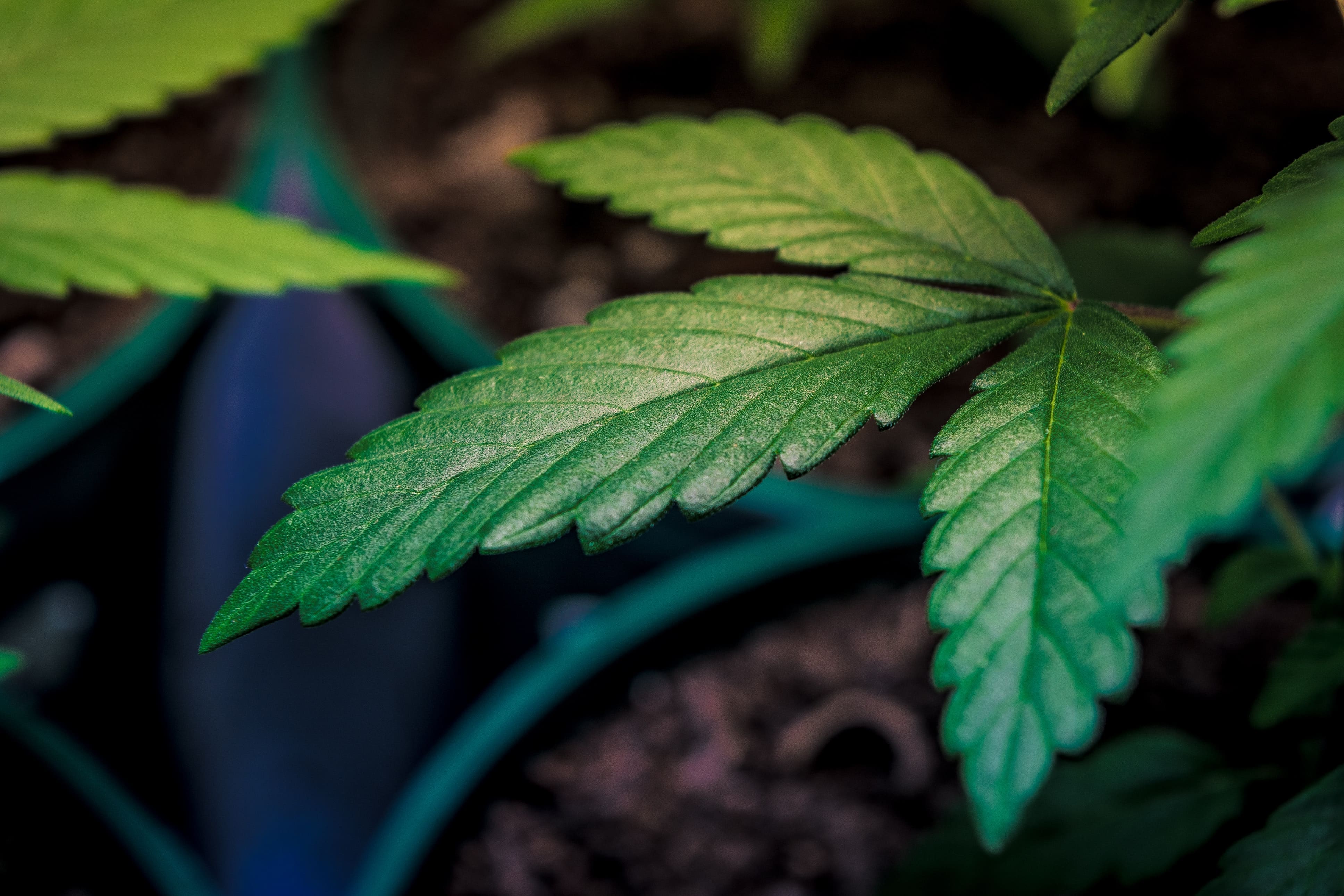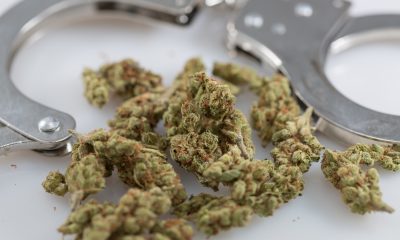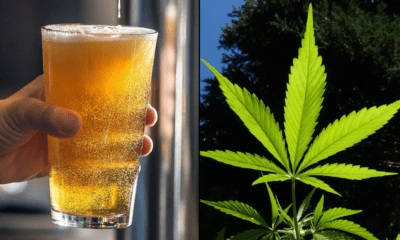Politics
Minnesota Senate Approves Marijuana Legalization Bill, Sending It To The Governor

The Minnesota Senate has sent a bill to legalize marijuana to the governor’s desk to be signed into law.
Senators passed the legislation from Sen. Lindsey Port (D) and Rep. Zack Stephenson (D) in a 34-32 vote early on Saturday morning.
“The best way that we can protect our kids from access to cannabis is by legalizing and regulating. This is an adult-use cannabis bill, which will be sold in 21-plus locations, just like we sell alcohol,” Port said ahead of the vote.
I'm filled with joyful, exhausted gratitude. This bill was a joint effort, and I had the best team around. My co-authors, esp @SenClareOumou and @epmurphymn, my staff, our research and nonpartisan team, and my partner every step of the way, @zackstephenson. Thank you. 💚 https://t.co/EtJKAYvpcu
— Senator Lindsey Port (@Lindsey_Port) May 20, 2023
“The system that we have right now is not working. It’s not achieving any of the goals we’re setting out for,” she said. “It is a public safety risk. It is a health risk. It is a risk to our children. It is not currently working. If we had a way to solve this with law enforcement, we would have done it.”
Now the reform, which cleared the House on Thursday, is on its way to Gov. Tim Walz (D), who has pledged to sign it and make Minnesota the 23rd state in the U.S. to end cannabis prohibition.
The Senate vote marks the end of a months-long legislative journey for the bill that involved numerous committee hearings in both chambers.
“This bill has always been about ensuring that the folks most harmed by cannabis prohibition benefit from legalization, and we know that Black Minnesotans are five times more likely to be charged for cannabis-related offenses than whites are,” Sen. Clare Oumou Verbeten (D) said ahead of the final vote. “That’s wrong. It’s a racial injustice.”
“This is our opportunity to actually right those wrongs. We do that by expunging records immediately. And to the folks who received those convictions or had family members that were convicted of using or selling cannabis, you deserve to be at the top of the line for the licenses. Others don’t just get to skip ahead when you’re the ones who lost jobs and lost housing and educational opportunities. You are the ones who suffered from prohibition, and we’re just not going to let folks profit off of this new market before you.”
Both the House and Senate previously passed differing versions of legalization bills, and those differences were resolved in a bicameral conference committee that finalized the legislation on Monday. The resolved bill then needed reapproval in both chambers.
Lawmakers worked quickly to get the job done, as the legislative session ends on Monday.
Democratic-Farmer-Labor legislators point to the achievement on cannabis reform as a direct result of voters putting the party in the majority in both chambers after last year’s election.
Who's ready to pass adult-use cannabis legalization and expungment? Minnesota is ready. I'm ready. The Senate is ready. Today is the day.
Legalize. Regulate. Expunge. https://t.co/jmkJUXdIdT
— Senator Lindsey Port (@Lindsey_Port) May 19, 2023
The legislation that advanced through both chambers is an iteration of the 2021 House-passed bill from former Majority Leader Ryan Winkler (D), who now serves as campaign chairman of the advocacy coalition MN is Ready.
“Ending cannabis prohibition has been a cause for decades, kept alive by people who took a lot of risk to stand against an unfair system,” Winkler said in a press release after the Senate vote. “Over the last four years, elected officials have worked hard to create a legal cannabis market that will work for Minnesota, and I am proud to have done my part.”
Walz has called on supporters to join lawmakers and the administration in their push legalize marijuana this session, and he circulated an email blast in January that encourages people to sign a petition backing the reform.
So cannabis passed the House, now what?
1) Senate takes up and passes the bill. Perhaps today, maybe over the weekend. This time of year, timing at the Legislature is fluid and hard to predict
2) Governor signs the bill
3) on August 1, it becomes legal to possess cannabis!— Zack Stephenson (@zackstephenson) May 19, 2023
Here are the main components of the final marijuana legalization bill, HF 100.
As of August 1, adults 21 and older could purchase and possess in public up to two ounces of cannabis and they would be allowed to cultivate up to eight plants at home, four of which could be mature. People could possess up to two pounds of marijuana in their residences.
Gifting up to two ounces of marijuana without remuneration between adults would be permitted.
It’s expected to take 12-18 months for licenses to be issued and sales to start. As of March 1, 2025, existing medical cannabis businesses could receive new combination licenses that would allow them to participate in the adult-use market.
Certain marijuana misdemeanor records would also be automatically expunged, with implementation beginning in August. The Bureau of Criminal Apprehension would be responsible for identifying people who are eligible for relief to the courts, which will process the expungements. A newly created Cannabis Expungement Board would also consider felony cannabis offenses for relief, including potential sentence reductions for those still incarcerated.
In addition to creating a system of licensed cannabis businesses, municipalities and counties could own and operate government dispensaries.
On-site consumption permits could be approved for events, and cannabis delivery services would be permitted under the bill.
Local governments would not be allowed to prohibit marijuana businesses from operating in their areas, though they could set “reasonable” regulations on the time of operation and location while also limiting the number of cannabis business licenses based on population size.
There would be a gross receipts tax on cannabis sales in the amount of 10 percent, which will be applied in addition to the state’s standard 6.875 percent sales tax.
Eighty percent of revenue would go into the state’s general fund—with some monies earmarked for grants to help cannabis businesses, fund substance misuse treatment efforts and other programs—and 20 percent would go to local governments.
A new Office of Cannabis Management would be established, and it would be responsible for regulating the market and issuing cannabis business licenses. There would be a designated Division of Social Equity.
The legislation would promote social equity, in part by ensuring diverse licensing by scoring equity applicants higher. People living in low-income neighborhoods and military veterans who lost honorable status due to a cannabis-related offense would be considered social equity applicants eligible for priority licensing. People convicted of cannabis offenses, or who have an immediate family member with such a conviction, would also qualify.
5) Also starting right away, a new agency— the Office of Cannabis Management— will start working on doing the work of setting up a legal market. Making rules, issuing licenses, etc. This will also take time, and I wouldn’t expect licensed dispensaries for up to 18 mo
— Zack Stephenson (@zackstephenson) May 19, 2023
—
Marijuana Moment is tracking more than 1,000 cannabis, psychedelics and drug policy bills in state legislatures and Congress this year. Patreon supporters pledging at least $25/month get access to our interactive maps, charts and hearing calendar so they don’t miss any developments.
![]()
Learn more about our marijuana bill tracker and become a supporter on Patreon to get access.
—
The House bill was vetted by numerous committees before reaching the floor. It passed the Ways and Means Committee, Taxes Committee, Transportation Finance and Policy Committee, Economic Development Finance and Policy Committee, Public Safety Finance and Policy Committee, Health Finance and Policy Committee, Education Finance Committee, Human Services Policy Committee, Workforce Development Finance and Policy Committee, Agriculture Finance and Policy Committee, State and Local Government Finance and Policy Committee, Labor and Industry Finance and Policy Committee, Environment and Natural Resources Finance and Policy Committee, Judiciary Finance and Civil Law Committee and Commerce Finance and Policy Committee (twice).
The Senate committees that signed off on the bill are the Finance Committee, Taxes Committee, Rules and Administration Committee, State and Local Government and Veterans Committee, Labor Committee, Human Services Committee, Health and Human Services Committee, Transportation Committee, Environment, Climate, and Legacy Committee, Agriculture, Broadband, and Rural Development Committee, Jobs and Economic Development Committee, Commerce and Consumer Protection Committee and Judiciary and Public Safety Committee (twice).
Following their election win in November, Democrats internally agreed to discuss the issue imminently.
A poll released last week found that 64 percent of Minnesota registered voters support creating a regulated marijuana market, including 81 percent of Democrats and a 49 percent plurality of Republicans.
Two polls released in September found that the majority of Minnesota residents support adult-use marijuana legalization—and one survey showed that even more Minnesotans approve of the state’s move to legalize THC-infused edibles that was enacted last year.
Not only will HF 100 legalize adult-use cannabis, it will provide automatic expungement of criminal records for tens of thousands of Minnesotans who have been convicted of low-level cannabis offenses.
— Minnesota Senate DFL (@SenateDFL) May 20, 2023
A survey conducted by officials with the House at the annual State Fair that was released in September also found majority support for legalization. That legislature-run poll found that 61 percent of Minnesotans back legalizing cannabis for adult use.
Support was up this year from 58 percent when the House Public Information Services polled fair goers on the issue in 2021. In 2019, the House poll found 56 percent support for legalization.
Meanwhile in Minnesota, the House separately passed an omnibus health bill last month that contains provisions to create a psychedelics task force meant to prepare the state for possible legalization.
And on Friday, the governor signed large-scale legislation that contains provisions to legalize drug paraphernalia possession, syringe services, residue and testing—a win for harm reduction advocates in the state.
Correction: This story was updated to clarify details of the bill’s expungements provisions.
Schumer Again Pushes For ‘Critical’ Criminal Justice Amendments To Marijuana Banking Bill
Photo courtesy of Philip Steffan.














